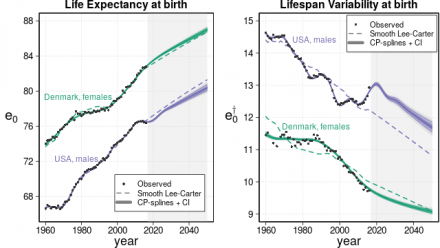Smooth Constrained Mortality Forecasting

Mortality can be forecast by means of parametric models, principal component methods, and smoothing approaches. These methods either impose rigid modelling structures or produce implausible outcomes. During the talk we propose a novel approach for forecasting mortality that combines a well established smoothing model and prior demographic information. We constrain future smooth mortality patterns to lie within a range of valid age profiles and time trends, both computed from observed patterns. Within a P-spline framework, we enforce shape constraints through an asymmetric penalty approach on forecast mortality. Hence we call the proposed approach a CP-spline model.
Moreover, we properly integrate infant mortality in a smoothing framework so that the mortality forecast covers the whole age range. The proposed model outperforms the plain smoothing approach as well as commonly used methodologies while retaining all the desirable properties that demographers expect from a forecasting method, e.g., smooth and plausible age profiles and time trends. We illustrate the proposed approach to mortality data for Danish females and US males.
Constraining future mortality to observed age profiles and time trends can also be viewed as a way of constraining different subpopulations to behave analogously in terms of mortality shape and trend. In this talk we explore this generalization of CP-splines to forecast the mortality of Australian states and territories.
The proposed methodology offers a new paradigm in forecasting mortality, and it is an ideal balance between pure statistical methodology and traditional demographic models. Prior knowledge about mortality development can be conveniently included in the approach, leading to large flexibility. The combination of powerful statistical methodology and prior demographic information makes the proposed model suitable for forecasting mortality in most demographic scenarios.
Carlo Giovanni Camarda (Giancarlo) is a chargé de recherche at INED (Institut National d’Études Démographiques) in Paris (France). From 2007 to September 2012, he has been research scientist at the Max Planck Institute for Demographic Research in Rostock (Germany). He received his first university education at the Università “La Sapienza” in Rome (Italy) on Social and Demographic Statistical Sciences. Later he continued his study at the Max Planck Institute for Demographic Research within the Laboratory of Statistical Demography. He was awarded the Ph.D. in “Mathematical Engineering: Statistical Sciences and Techniques Area” at the Department of Statistics at Universidad Carlos III in Madrid with a dissertation on “Smoothing Methods for the Analysis of Mortality Development”.
His interests range from mortality forecasting with smoothing techniques and by age-at-death distributions to general theory for the biodemography of human ageing to modeling patterns of digit preference, warping models for lifetime distributions, modelling and smoothing mortality surfaces and reconstruction of mortality series by causes of death. He also has numerous collaborations in European research institutions and he has been involved in various teaching activities. In the past years, he has written some research papers in the field of demography and statistics and he has devised an R package for smoothing and forecasting mortality.









